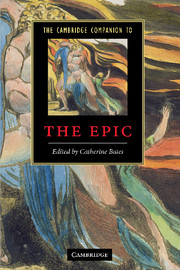Book contents
- Frontmatter
- 1 The Epic of Gilgamesh
- 2 Greek epic
- 3 Roman epic
- 4 Heroic epic poetry in the Middle Ages
- 5 Dante and the epic of transcendence
- 6 Italian Renaissance epic
- 7 Camões’s Os Lusíadas: the first modern epic
- 8 The Faerie Queene: Britain’s national monument
- 9 The seventeenth-century Protestant English epic
- 10 Mock-heroic and English poetry
- 11 Romantic re-appropriations of the epic
- 12 Ezra Pound, T.S. Eliot, and the modern epic
- 13 Derek Walcott’s Omeros
- 14 Epic in translation
- Guide to further reading
- Index
13 - Derek Walcott’s Omeros
Published online by Cambridge University Press: 28 May 2010
- Frontmatter
- 1 The Epic of Gilgamesh
- 2 Greek epic
- 3 Roman epic
- 4 Heroic epic poetry in the Middle Ages
- 5 Dante and the epic of transcendence
- 6 Italian Renaissance epic
- 7 Camões’s Os Lusíadas: the first modern epic
- 8 The Faerie Queene: Britain’s national monument
- 9 The seventeenth-century Protestant English epic
- 10 Mock-heroic and English poetry
- 11 Romantic re-appropriations of the epic
- 12 Ezra Pound, T.S. Eliot, and the modern epic
- 13 Derek Walcott’s Omeros
- 14 Epic in translation
- Guide to further reading
- Index
Summary
Centuries of critical study have established a working consensus regarding the standard components of the classical epic. At the same time, centuries of writers have produced subtle changes and experimental variations so that this venerable genre turns out to be more flexible than academic purists might prefer. As early as Dante, the elevated heritage of the epic managed to survive the insertion of the poet as a participant in the action. Later the definition has been expanded in order to accommodate the prose of Melville and then Joyce, with common seamen or citizens of Dublin as protagonists. Over time the idea of heroic action has undergone serious re-evaluation, and our postmodern age questions the legitimacy of any hierarchical literary canon. Against this fluid background, Derek Walcott published his extended West Indian narrative poem, Omeros, in 1990. Whereas predecessors in the epic field might depend upon a cohesive national, racial, or spiritual framework, Walcott assembles his story out of the detritus of imperial exploitation and colonial neglect. Born on the tiny island of St Lucia in the Lesser Antilles (1930), the mulatto descendant of European masters and African slaves, he writes of fragmented cultures and uprooted peoples dealing with life in their marginalized corner of the world. With such an unpromising point of departure, the initial challenge is in drawing out the relevance of their struggle.
- Type
- Chapter
- Information
- The Cambridge Companion to the Epic , pp. 234 - 245Publisher: Cambridge University PressPrint publication year: 2010
- 1
- Cited by

